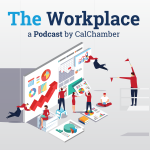
In Episode 23 of The Workplace, CalChamber President and CEO Allan Zaremberg discusses California’s revenue surge and continued calls for new taxes with longtime California political expert Dan Walters. They also delve into some of the most pressing issues at the state Capitol this year, including Dynamex and privacy legislation.
Tax Seekers Ignore Surplus
In the last year, California brought in $1 billion more than expected from income taxes. Despite this surplus, some groups are pushing for increased taxes to pay for additional or pad existing programs.
The state tax system, however, is volatile and state revenues heavily rely on income taxes from top state earners, Walters says. “When the recession hits and the nation gets a cold, we get pneumonia in California,” explains Walters.
In 2019, 70% of California’s General Fund revenues come from personal income taxes.
“The top 1% of taxpayers, about 15,000 in a state of 40 million, pay half of those income taxes, so we are totally dependent on how well a handful of high-income people are doing,” says Walters.
Continuing the fiscal prudence of his predecessor, Governor Gavin Newsom is putting money in the rainy day reserve and using extra funds for one-time spending, such as giving pension funds an extra boost.
Walters notes that Newsom also put a sunset date on new services, such as early childhood education, so if there is a recession, the program “cuts itself, automatically.”
“If we have a 21 billion-dollar rainy-day reserve and on top of that some one-time expenditures that could cover a recession, why in the world would anybody want to raise taxes?” asks Zaremberg.
There’s no shortage of people who say they could do more with more funding, Walters replies—public employee unions, and advocates for social services, health programs, early childhood education, and schools.
As for property taxes: “We are going to see another five or six billion dollars more in property tax revenue for the state as a whole that goes to schools and local governments,” explains Walters. “The school situation is a little funny because the more property taxes the schools get, that means they get less state aid… Schools don’t fully benefit from that, but local governments are seeing a very, very nice boost in property tax payments this year, thanks to new assessed valuation.”
Outside Forces
One of the most pressing issues at the Capitol that has the potential to impact a broad range of California businesses is pending legislation on classifying independent contractors in response to the Dynamex decision last year.
Usually, Walters says, someone is trying to legislate one way and then the opposition surfaces. The politics in this instance are reversed, with the Supreme Court—an outside force—first laying down a narrow ruling (Dynamex Operations West, Inc. v. Superior Court of Los Angeles) and the legislation coming after.
“The real question is not whether it’s going to happen, but who it’s going to happen to, and that’s where the Legislature gets involved, and the question is how many professions… will be exempted from the Dynamex ruling that the Supreme Court laid down,” says Walters.
Zaremberg asks: Shouldn’t the Legislature have addressed this issue a long time ago?
“Yes, somebody should have been thinking about this a long time ago and somebody should have been doing it judiciously,” Walters says. “Well, this is not judicious; this is hurry up legislation.”
Another issue being driven by forces outside the Legislature is privacy, with the privacy legislation being passed in an effort to head off a ballot initiative.
“This is not something that should be done state by state by state,” Walters comments.
“The internet doesn’t stop at the state line,” remarks Zaremberg. “People want to protect their privacy and their data, but they also want to be able to find Mexican restaurants near me, they want their loyalty programs, and they want to take advantage of the data that somebody puts together and helps them with.”
It’s a tradeoff, Walters responds. “How much privacy are you willing to give up for convenience, and how much convenience are you willing to give up for privacy? That’s almost as individual as fingerprints, so it makes it very difficult to have a one-size-fits law,” he says.
Employers in California will have to wait to see how the Legislature adapts new laws to fit changing technology in the workplace.
Subscribe to The Workplace
Subscribe to The Workplace on iTunes, Google Play, Stitcher, PodBean and Tune In. To listen or subscribe, visit www.calchamber.com/theworkplace.

